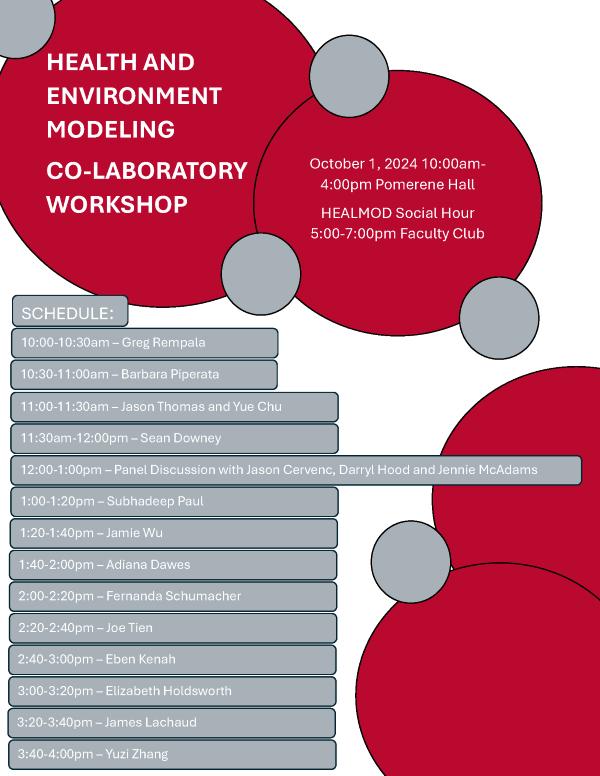HealMod Events
The HEALMOD PIs would like to kick off a pilot project with the goal of generating a paper that can be broadly representative of our research group. Details will be disscused during our first meeting, which will occur on March 25, 11-12pm and then meet every other week until the end of the semester.
Purpose: The goal of these meetings is to develop an impactful project (i.e., paper) related to health and environmental modeling that we can achieve within the group. The PIs have defined a broad question which we hope to refine and operationalize through these meetings:
In the Age of Machine Learning, is Theory Dead?
Here are some initial ideas about how to achieve this:
- Comparing structured modeling approaches (e.g., ABM or statistical models including frequentist and Bayesian) that encode a priori information about a system, to unstructured models (e.g., machine learning, convolutional neural networks, foundational models such as Meta’s segment anything, and large language models).
- Use the breath of HEALMOD expertise to develop side-by-side comparison of paired methods (structured/unstructured models) in a range of themes (e.g., human demography and mortality, biocultural approaches to the human microbiome, and coupled systems and sustainability.
- Analyzed the strengths and weaknesses of each modeling approach (structured/unstructured) in each subdomain with respect to received theoretical considerations within respective disciplines. In other words, explore the relevance of “theory’ in each domain.
For more information contact Prof. Sean Downey
| Date | Name | Title |
|---|---|---|
| Tuesday, March 25, 2025 | Sean Downey | Reading(s): Dubova, M., Chandramouli, S., Gigerenzer, G., Grünwald, P., Holmes, W., Lombrozo, T., ... & Sloman, S. J. (2025). Is Ockham’s razor losing its edge? New perspectives on the principle of model parsimony. Proceedings of the National Academy of Sciences, 122(5), e2401230121. |
| Tuesday, April 8, 2025 | Jason Thomas | We'll go through a high-level overview of the Bayesian approach to inference. The associated readings are the first two chapters of Richard McElreath's book Statistical Rethinking2 Part 1 |
| Tuesday, April 22, 2025 | Katherine Daiy | Reading(s): Goldman, Doran A., et al. Competition for shared resources increases dependence on initial population size during coalescence of gut microbial communities Proceedings of the National Academy of Sciences 122.11 (2025): e2322440122. |
| Tuesday, May 06, 2025 | Jason Thomas | We'll go through a high-level overview of the Bayesian approach to inference. The associated readings are the first two chapters of Richard McElreath's book Statistical Rethinking2 Part 2 |
Schedule
Click here to view pdf file: HealMod Spring'25 Seminars
The 2024 HealMod Annual Workshop will serve as an introductory gathering for faculty at OSU who may be interested in collaborating within the HEALMOD framework. To that end, we have invited colleagues working across a broad range of fields, including epidemiology, computational sociology, human-environment interactions, statistics, and data science.
If you are interested in joining, please register here: https://osu.az1.qualtrics.com/jfe/form/SV_7VBJHwMtoHab3Rs

HealMod Sponsored Events
Join the Center for Latin American Studies, the Health and Environmental Modeling Community (HEALMOD), the Infectious Diseases Institute, and the Center for Microbiome Science as we welcome Dr. Chris Hoffman (University of Sao Paulo, Brazil) for a lecture on how changes in dietary patterns are influencing the gut microbiome of the Brazilian population.
Feel free to bring your own lunch, drinks will be provided.
More information and registration can be found here: https://clas.osu.edu/events/exploring-gut-microbiome-diversity-and-nutrition-transition-brazil
Inequality and Mobility in a Minimal Model for Evolving Income Distributions
Scott McKinley (Joint work with Gary Hoover, Murphy Institute for Political Economy)
In this work we explore the dynamic relationship between income inequality and economic mobility through a pairing of a population-scale partial differential equation (PDE) model and an associated individual-based stochastic differential equation (SDE) model. We focus on two fundamental mechanisms of income growth: (1) that annual growth is percentile-dependent, and (2) that there is intrinsic variability from one individual to the next. Under these two assumptions, we show that increased economic mobility does not necessarily imply decreased income inequality. In fact, we show that the mechanism that directly enhances mobility, intrinsic variability, simultaneously increases inequality.
Using Growth Incidence Curves, and other summary statistics like mean income and the Gini coefficient, we calibrate our model to US Census data (1968-2021) and show that there are multiple parameter settings that produce the same growth in inequality over time. Strikingly, these parameter settings produce dramatically different mobility outcomes. This analysis echoes the exhortations of Carrol and Chen (Economic Commentary, 2016), among others, to consider these aspects of the economy in parallel. Even in the simplest of models, enhancing economic mobility, in and of itself, is not a prescription for decreasing income inequality.
